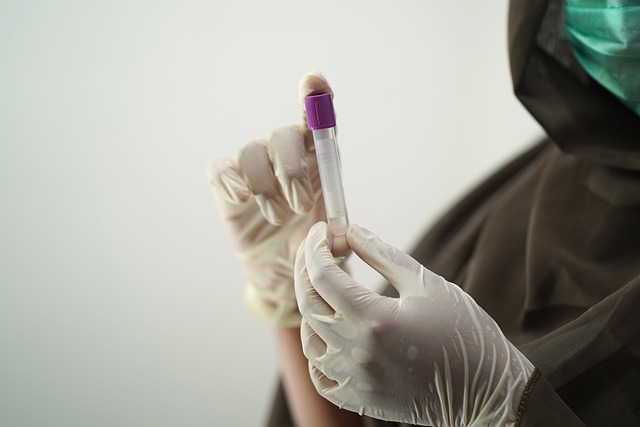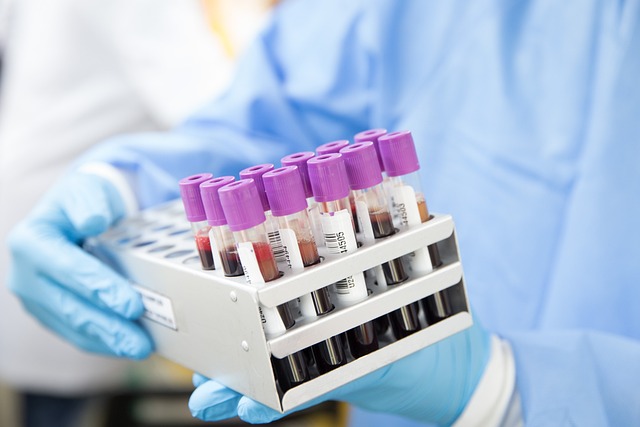In the UK, managing diabetes effectively relies on regular blood testing, which is facilitated by the NHS through accessible home monitoring kits. Understanding diabetes blood tests, such as HbA1c and glucose tolerance tests, is crucial for both Type 1 and Type 2 diabetes patients to assess their condition's management over time without the need for fasting. These tests help patients and healthcare professionals make informed decisions about treatment adjustments, medication changes, and lifestyle interventions. Home monitoring allows individuals to self-check glucose levels in real-time, with continuous glucose monitoring (CGM) systems providing additional insights into blood sugar trends. It is essential for patients to document their readings and understand their condition to recognize patterns and deviations from target ranges. Any concerning results should prompt a consultation with a healthcare provider. These home test results are integrated into NHS health records, supporting a personalized and effective diabetes management strategy in the UK. Diabetes Blood Test UK is a key component of this approach, ensuring that individuals can actively participate in their care and potentially avoid long-term complications associated with the condition.
navigating diabetes management has become more manageable for individuals across the UK, thanks to the advent of home health testing. This article delves into the essential aspects of diabetes blood tests that can be conducted from one’s home, offering a clear understanding of ‘Diabetes Blood Test UK’ procedures and how to effectively manage and interpret results. Whether you’re newly diagnosed or an established patient seeking better control over your condition, this guide provides valuable insights into maintaining optimal health at home.
- Understanding Diabetes Blood Tests: A Comprehensive Guide for Individuals in the UK
- The Process and Importance of Diabetes Blood Testing at Home in the UK
- How to Manage and Interpret Your Diabetes Blood Test Results from the Comfort of Your Home in the UK
Understanding Diabetes Blood Tests: A Comprehensive Guide for Individuals in the UK

In the UK, diabetes management is a pivotal aspect of maintaining overall health, and understanding diabetes blood tests is integral to this process. A diabetes blood test, often referred to as an HbA1c test or glucose tolerance test, provides a comprehensive view of blood sugar levels over time. The HbA1c test, specifically, measures the average blood glucose levels over the past two to three months, offering valuable insights into how well diabetes is being managed. This test is particularly useful as it does not require fasting and can be conducted at any time of day. For individuals with diabetes, regular monitoring of HbA1c levels is crucial in assessing the effectiveness of medication and lifestyle changes. It’s a non-fasting blood test that provides a retrospective insight into blood sugar control, which is vital for those managing either Type 1 or Type 2 diabetes. In addition to the HbA1c test, a glucose tolerance test measures blood glucose levels at various points before and after ingesting a glucose solution, offering a dynamic view of how the body processes sugar. Both tests are available through the NHS and private healthcare providers across the UK, ensuring accessible diabetes monitoring for all individuals who require it. Understanding the results of these tests empowers patients to make informed decisions about their health, in collaboration with healthcare professionals, leading to better diabetes management and potential prevention of long-term complications associated with the condition.
The Process and Importance of Diabetes Blood Testing at Home in the UK

In the UK, managing diabetes is a critical aspect of maintaining overall health and preventing long-term complications. Diabetes blood testing at home has become an invaluable tool for individuals with diabetes, offering convenience and flexibility while ensuring consistency in monitoring blood glucose levels. The process begins with obtaining a test kit, which can be acquired through the National Health Service (NHS) or purchased over the counter from pharmacies. These kits include lancets, test strips, and a lancing device to prick the skin and obtain a drop of blood. Users then apply a strip to the blood drop and use a meter to measure the glucose concentration. This data is crucial for understanding how different foods, physical activities, and medications affect an individual’s blood sugar levels, enabling personalized adjustments to diet and insulin dosages. Regular home monitoring facilitates timely interventions, potentially averting acute episodes of hyperglycaemia or hypoglycaemia, thus playing a pivotal role in the effective management of diabetes in the UK.
The importance of home blood glucose testing for individuals with diabetes cannot be overstated. It empowers patients to take an active role in managing their condition and makes it possible for those living with diabetes to lead full, healthy lives. The NHS recognizes the significance of these tests and has implemented programmes that support individuals in mastering the technique. Diabetes UK also provides guidance and educational resources, ensuring that people are well-equipped to interpret their results accurately and make informed decisions about their health. With the advent of continuous glucose monitoring (CGM) systems, which provide real-time glucose readings without the need for finger-prick tests, home testing is becoming even more sophisticated. This advancement not only simplifies the process but also offers comprehensive data that can be shared with healthcare providers to optimize treatment plans and outcomes for individuals with diabetes in the UK.
How to Manage and Interpret Your Diabetes Blood Test Results from the Comfort of Your Home in the UK

Managing and interpreting diabetes blood test results from the comfort of your home in the UK has become a straightforward process with advancements in technology and healthcare services. Individuals can now monitor their glucose levels using home monitoring kits, which are widely available and approved by the National Health Service (NHS). To begin, it is essential to understand the type of diabetes you have; this will dictate how often you should perform these tests. For type 1 diabetes, checks may be more frequent than for type 2 diabetes. Always follow the guidelines provided by your healthcare provider or the NHS’s advice on when and how to test your blood glucose levels.
Once you have taken the sample, using a lancing device to obtain a drop of blood from a fingertip, apply the test strip to the blood drop according to the manufacturer’s instructions. The home monitoring device will then display your blood glucose level within moments. It is crucial to record these results, along with the date and time of day, as patterns in your blood sugar levels can inform you and your healthcare team about your condition’s management needs. If your results are consistently above or below your target range, consult your GP or diabetes specialist for advice. They may recommend dietary changes, medication adjustments, or further tests like HbA1c to provide a broader view of your blood sugar control over the past two to three months. Remember to sync these results with your NHS health records if possible, ensuring a comprehensive understanding of your health status and enabling more effective diabetes management.
In conclusion, managing diabetes at home through self-administered blood tests offers a convenient and reliable method for individuals in the UK to monitor their health. The insights provided by understanding and interpreting these tests are crucial for effective diabetes management. With the guidance offered in ‘Understanding Diabetes Blood Tests: A Comprehensive Guide for Individuals in the UK’ and the practical steps outlined in ‘The Process and Importance of Diabetes Blood Testing at Home in the UK’, individuals can confidently take control of their health from the comfort of their own homes. By knowing how to manage and interpret diabetes blood test results as detailed in ‘How to Manage and Interpret Your Diabetes Blood Test Results from the Comfort of Your Home in the UK’, self-monitoring becomes a powerful tool in maintaining optimal health and wellbeing. For those in the UK, diabetes blood tests are not just a medical procedure but a vital aspect of daily life that can significantly enhance one’s quality of living.
